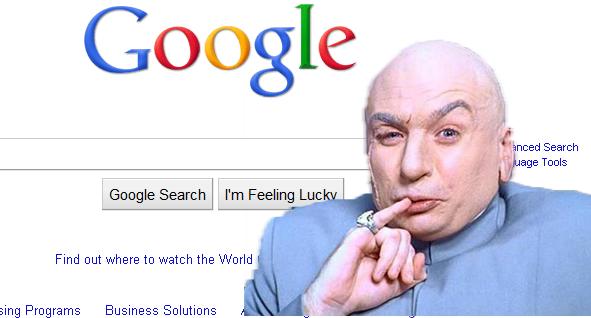Google’s motto is Don’t Be Evil – so why is it using its muscle to snuff legitimate businesses it doesn’t happen to like?
Perhaps the more accurate term is understand.
Google doesn’t like – or understand – short-term lenders, more commonly known as “payday” lenders. So it has decided to wage economic war on them by excluding their ads from its AdSense service. Which is a big deal because Adsense is the dominant vehicle for online advertising. If you are locked out of Adsense, you are effectively locked out of making money via advertising online.
But what’s Google’s beef?
So-called “payday” lenders are disparaged as usurious for charging interest rates that are higher than rates charged by traditional lenders, such as banks. But this is a facile criticism that betrays a lack of understanding about interest as well as the differences between a short-term loan and a 10 or 15 out 30-year loan.
Or even a six-year loan (like a car loan).
Interest is the fee charged to use someone else’s money.
Short-term loans cost more because the loan is … shorter.
Sometimes, just for a week or so. Hence the “payday” reference. A person needs a quick loan to bridge a gap between today and payday. Banks and other traditional lenders do not make such loans.
And if they did, they’d charge more, too.
As it is, they already charge a lot.
Ever look at your home loan statement? How much interest does the average person pay over 30 years on a $250,000 principal? It may be “only” 5 percent – but check out the total amount you pay over that 30-year period: $483,139 – of which $233,139 is interest (see here).
That’s a lot of interest – about as much interest as principle.
But Google isn’t calling bank lenders “predatory” – or blacklisting them from Adsense.
Just the short-term/payday lenders.
Why?
How is paying am amount equal to the principal of the loan over 30 years any less “predatory” than paying say 30 percent of the principle in interest over a week?
And is either evil for doing so?
How about hotels? They also charge more per night (often, a great deal more) than it would cost to rent an apartment per night. Yet no one accuses hotels of “predatory” behavior.
People do kvetch about the $5 cokes in the mini-bar, but accept that it’s the price of convenience.
And the same’s true of short-term loans.
Anyone who has ever applied for a conventional loan knows that if you need the money right now – or even next week – the odds of getting it this way are as likely as winning the Powerball. The paperwork is labyrinthian; the process Byzantine.
Contrast this with the convenience of the short-term lender. One presents a pay stub as proof of income (or, in some cases, provides documentation of an asset to secure the loan, such as title to a vehicle) and within minutes, one has the cash.
Like the $5 can of Coke in the hotel mini-bar, you’ll pay more than you would have if you’d taken the elevator to the lobby, walked down the street to the store and bought a can of Coke at the 7-11.
But is it wrong for the hotel to charge you $5 for the mini-bar Coke? No one’s forced to buy the Coke. It is simply available. You’’re free to buy it – or not.
It’s the same with short-term lenders. They aren’t forcing anyone to do business with them. They offer a service – and convenience. Like checking into a hotel on the spur of the moment and availing yourself of the $5 can of Coke in the mini-bar, it’s an expense people freely choose to assume in exchange for the service provided.
For the convenience offered.
But Google won’t be banning Marriott ads or insisting that $5 mini bar Cpkes be outlawed or that home loans no longer charge people interest that’s as much as the amount of the loan.
It will, however, ban ads from short-term lenders effective July 13. It claims these businesses are “deceptive” and “harmful.”
Well, where is the deception?
Can anyone trot out evidence of fraud? Are the short-term lenders not up-front about the fees they charge for the service they provide? Or is it a question of Google not liking the services they provide?
One could just as easily turn that around and accuse Google’s near-absolute control of online advertising via its Adsense service as “harmful,” too. It is harder to obtain website advertising outside of the Adsense universe. Because virtually all major advertisers have a deal with Google and only advertise via Google (Adsense).
Like short-term lenders, Google Adsense appeals because it offers a particular service that no one else does – or offers a better service than others do. It is able to set terms and conditions, which we’re free to like or not.
Is that “predatory”? Or just business?
We don’t have to like the way Google – or payday lenders – do business. The relevant issue is whether the business is legitimate.
Adsense – like short-term lending – is a legal business. Google can’t force anyone to advertise via Adsense – and businesses are free to place ads outside of the Google universe, working directly with web site publishers (cutting out the Adsense middle man).
Just as people are free to seek needed cash outside of the short-term lender universe.
Or buy a can of Coke from 7-11.
Google’s moralistic tub-thumping is cloying because it’s ignorant and hypocritical.
Blackballing businesses they don’t like – or understand – is certainly their right.
But it’s not good business – or good karma.
END










I wonder about meddling do-gooders. They seem to vary from those who are just stupid and think something is preying on a person’s condition all the way to those who seem evil and want to make sure people who are having a bad time of things have no way to climb their way out of the hole.
Payday loans and other such things are only a problem when the customer doesn’t understand what he’s getting into. If the lender is misleading people that’s fraud and there are laws for that already. If the customer doesn’t understand it after having it explained then maybe the government schools are the problem. Why didn’t they teach basic life skills such as calculating interest?
There is a growing amount of legal (for the moment, anyway) businesses out there that are disfavored by the elite running the federal government. Ask anyone in the firearms & hunting, smoking & vaping, p*rn, contrarian media, pawn & non-bank loan businesses, what its been like the last decade or so (especially since 9-11) to do things that used to be easier. Like getting business credit & loans, being allowed to advertise, or the ability for their customers to use credit cards or things like pay pal.
If those large big business weren’t turning the screws themselves, the government has made it clear to the rest of them, that they must do their bidding. It seems most in the computer business have the same mindset as the elite, so they don’t even have to require it yet.
Sites like google and facebook could be places where free speech is championed. However their history is quite the opposite when it comes to that, even though the claim they are for free speech.
I guess that is why many of us are afraid of how government does and could use technology to spy on us. The people running those tech firms don’t even have to be forced to do it, they are quite willing in fact.
As I understand it, most of them are in fact adherents to the same philosophies – some because they’re PART of the Elites.
Billie Gates: Was always an NWO type, an Agenda 21 type. No children, champions causes which result in injury to and murder of others.
Zuckerberg: Related to the Rothschilds, IIRC. So was an NWO/Agenda 21 fan, and likely also a eugenecist.
Don’t know who built Twitter, but I’d wager good money it’s the same there.
What’s the ideal, people? I mean, the IDEAL, IDEAL business plan?
Be a weapons supplier and arm BOTH sides of a conflict – that you in fact created.
E.G., make a Binny Lodden; buy an elected official, and tell them their job is to fight each other… And then sell each side weapons and warriors.
And you don’t really need to “buy” the elected official, or build a Binny. Just work on a company connection. E.G., own Armalite. (Stock, don’t even need the company.)
There’s always conflict in the world…. Send your friend Jim to talk to his old classmate, Mark – who is in government. Jim “leaks” insider information about Armalite weapons getting to Binny L. (Doesn’t need to be true.) Armalite is upset, demands protection, and will make a good donation to the re-election fund….
Meantime, CIA wants to accomplish “X” (Opium trade, say, a la Afghanistan). Armalite’s guns are helpful in that… and can be re-sold to the local ground forces…
Note you only needed three people to actually make contact. I’m sure someone who was really good would be able to do it with fewer moving pieces…
It’s a big club. You ain’t in it….
What people with no knowledge of economics (which, unfortunately, includes the vast majority these days) don’t realize is that there are many factors involved in setting an interest rate. One of these is risk – and people who resort to ‘payday’ loans are generally high risk.
Always wondered how the people against payday loan shops calculated the interest rate. Sure, a 12% loan stretched out over 50 years or whatever astronomical timeframe the used would be 10,000% interest, but for a few days it’s… 12%.
I’ve used payday loan services in the past. I’ve used pawnshops too. At the time, I didn’t have a full time job and was going to school. They served a purpose (along with the used record store). No one dragged me in there. When I wanted to buy a house, I could either save money for 40+ years (all the while making rent payments too), or take out a very expensive mortgage. Not much of a choice, either get a mortgage or keep renting. Who’s the real predatory lender here?
While Google’s morals might be the reason stated, I’m fairly sure the business isn’t all that great these days. Credit cards are available to anyone with a pulse. Uncle is buying votes with EBT cards and “disability” welfare. Younger adults are living at home. Not anywhere near the business it was in the 80s and 90s. I’m sure someone at Google looked at the numbers and decided that it was time to drop the accounts. This just lets them generate a few feel good press releases.
The problem as I see it and as many of the legal profession and others who want to clean up govt. see it, is this: These payday loans that don’t get paid back are civil debts but people are being jailed for failure to pay. There is a terrible problem of this in all states and groups in Tx. are bringing it to the light.
Failure to pay is a civil problem, a contract between two entities, not something that can be used for a debtors prison….and therein lies the problem…..and the worse the economy gets, the worse the problem. Nobody was getting jailed for failure to fulfill a contract before the economy collapse in ’08. One thing our forefathers sought to escape was debtors’ prison, something that’s made a resurgence since lending institutions started getting stiffed big time sine the shrub bunch brought down the house of cards and debtors prison was their only ace up the sleeve, something that hasn’t worked out for anyone involved,, esp. the taxpayer who is the one really getting stiffed to house and care for people who’s only crime isn’t a crime.
At one time, ‘debtors’ prisons’ were work farms, or some such, where one was sent to pay off his debt. But you’re right, there is no call for gunvermin to be involved in such.
BTW, is ‘civil problem’ a contradiction in terms?